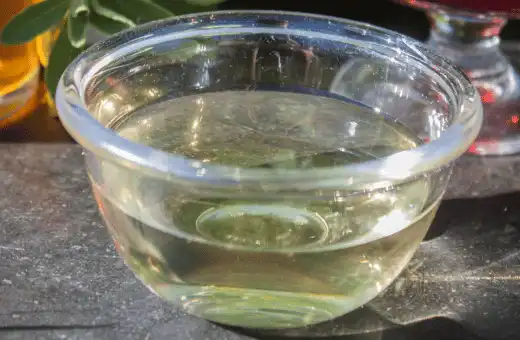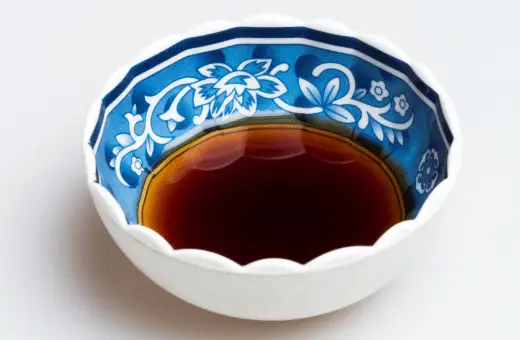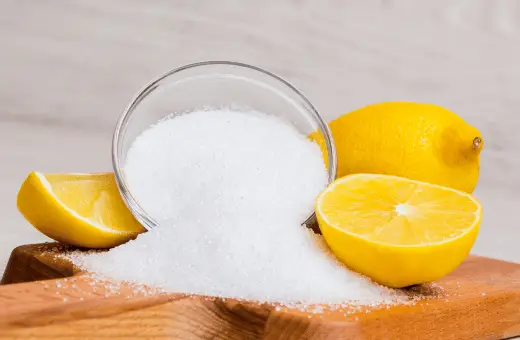Deviled eggs are a definitive appetizer that can be found at just about any party or get-together.
The tangy flavor of apple cider vinegar helps to offset the richness of the yolk filling and really takes these eggs to the next level.
But what occurs when you don’t have any apple cider vinegar on hand or you don’t like the taste? Fear not, my fellow home cooks!
In this blog, we’ll be discussing the 12 best substitutes for apple cider vinegar in deviled eggs, complete with ratios and instructions on how to use them.
In short, " What can I use instead of Apple cider vinegar?" White Wine Vinegar, Red Wine Vinegar, Champagne Vinegar, Lemon Juice, Lime Juice, Rice Vinegar, Balsamic Vinegar, Sherry Vinegar, Tarragon Vinegar, Citric Acid, Coconut aminos, and Malt vinegar.
What is Deviled egg, and what does deviled egg taste like?
Deviled eggs are a popular appetizer or snack made from hard-boiled eggs that have been halved lengthwise.
The yolks are removed, mashed, seasoned, and mixed with other ingredients before being piped or spooned back into the egg whites. They are typically garnished with various toppings and spices.
The filling for deviled eggs often includes:
– Egg yolks: These are mashed and serve as the base for the filling.
– Mayonnaise: It adds creaminess and richness to the filling.
– Mustard: Typically, a tangy mustard like Dijon or yellow mustard is used, which provides a distinct flavor.
– Vinegar or pickle juice: These ingredients add a touch of acidity and brightness.
– Salt and pepper: These seasonings enhance the overall taste.
Additional variations can include ingredients such as chopped pickles, onions, herbs (such as chives or parsley), paprika, hot sauce, or Worcestershire sauce.
The filling is mixed until smooth and well combined, and then it’s spooned or piped back into the egg white halves.
As for the taste, deviled eggs have a delightful combination of flavors. The filling is creamy, slightly tangy, and subtly savory.
The mustard and vinegar add a zing, while the mayonnaise contributes a smooth and rich texture. The overall taste is well-balanced, with hints of salt and pepper.
The toppings and seasonings used can further enhance the flavor, adding a touch of spiciness, sweetness, or smokiness, depending on the chosen ingredients.
Why do you add vinegar to deviled eggs?
Adding vinegar to deviled eggs gives them a tart flavor and helps balance out the richness of the egg yolks.
Vinegar also serves as an emulsifying agent, which binds different ingredients together. This binding property is especially useful when making creamy fillings for deviled eggs.
The acetic acid in vinegar also adds flavor and helps prevent bacterial growth, keeping the eggs safe to eat.
Uses of Apple cider vinegar in cooking
One of the most ordinary uses of apple cider vinegar is as a salad dressing or marinade.
The acidic tang adds flavor and depth to salads while also helping break down the fibers of tougher ingredients like meats and vegetables.
It can even be used to tenderize certain cuts of meat when making stews and roasts.
Apple cider vinegar can also use for pickling vegetables or making sauces.
Its tartness helps balance out heavier flavors in more savory dishes such as chili, while its sweetness makes it great for desserts like pies and fruit cobblers.
Counting a splash of apple cider vinegar to cooked beans or legumes can also help them preserve their natural colors without compromising flavor.
Aside from cooking, apple cider vinegar is also renowned for its medicinal properties; its antioxidants help fight free radicals, which cause inflammation and tissue damage in the body.
When taken internally, apple cider vinegar can help regulate blood sugar levels and aid digestion through its probiotic content, resulting in improved energy levels throughout the day.
It’s even said to aid in weight loss by curbing cravings for sugary snacks between meals.
Clearly, there are many uses for apple cider vinegar, both in cooking and health remedies, making it an essential pantry staple that should not be overlooked!
Where to buy ACP?
If you are looking for ACP where to buy, there are a few other places you can go. Many specialty food stores carry it, as do some international grocery stores.
You can also order online from many retailers that provide a variety of diverse flavors and types of ACP.
Best substitutes for apple cider vinegar in deviled eggs
Luckily, there are multiple other options that you can use instead of apple cider vinegar to take your deviled eggs to the successive level.
1. White Wine Vinegar – a good substitute for apple cider vinegar in deviled eggs

White wine vinegar is a superb alternative for apple cider vinegar in deviled eggs, as it has a milder savor than apple cider vinegar and will not overcome the other flavors in the dish.
It has a similar level of acidity but a milder taste.
Ratio or measurement: Use it in a 1:1 ratio, and adjust as needed.
2. Red Wine Vinegar
If you’re looking for a bolder flavor, red wine vinegar might be the way to go. It has a more pronounced taste than white wine vinegar but still works well in deviled eggs.
Ratio or measurement: Use it in a 1:1 ratio, but be careful not to overpower the other ingredients.
3. Try Champagne Vinegar instead of apple cider vinegar in deviled eggs
Champagne vinegar is a bit more expensive than other vinegar, but it’s also more delicate and slightly sweet.
Ratio or measurement: Use it in a 1:1 ratio, and you'll be amazed at how much flavor it adds to your deviled eggs.
4. Lemon Juice

Lemon juice can also work wonders when making deviled eggs! Lemon juice adds an incredible tart flavor while giving off its bright yellow hue, which makes it aesthetically pleasing too!
Of course, you should always remember that lemon juice naturally doesn’t have any preservatives or additives, so it won’t last as long as other types of vinegar – use it accordingly!
Ratio or measurement: You can substitute 1 tablespoon of lemon juice per tablespoon called for by the recipe but adjust according to your own tastes depending on how lemony you want your finished product to turn out!
5. Lime Juice – a great alternative for apple cider vinegar in deviled eggs
If you want a slightly distinct twist on deviled eggs, try using lime juice instead of apple cider vinegar. It has a slightly varied flavor profile but still works well.
Ratio or measurement: Use it in a 1:2 ratio, and adjust as needed.
6. Rice Vinegar
Rice vinegar is a staple in multiple Asian cuisines, and it works well as a substitute for apple cider vinegar in deviled eggs.
It has a milder taste than other vinegar, so you may require to use a bit more.
Ratio or measurement: Start with a 1:1 ratio, and adjust as needed.
7. Use Balsamic Vinegar in place of apple cider vinegar in deviled eggs
Balsamic vinegar has a strong, complex taste that may not be everyone’s cup of tea. However, if you enjoy the flavor, it can add a delicious richness to your deviled eggs.
Ratio or measurement: Use it in a 1:1 ratio, but be careful not to overpower the other ingredients.
8. Sherry Vinegar

Sherry vinegar is another great choice if you’re looking for a substitution for apple cider vinegar.
It’s more mellow than regular distilled white vinegar. It has an almost sweet and nutty savor that pairs well with deviled eggs’ creamy texture.
Ratio or measurement: Use it in a 1:1 ratio, and adjust as needed.
This will ensure that your deviled eggs don’t taste overly acidic while providing enough acidity to make them delicious.
9. Tarragon Vinegar – A tasty replacement for apple cider vinegar in deviled eggs
Tarragon vinegar is infused with the flavor of tarragon, a herb that’s often used in French cuisine. It adds a subtle anise flavor to your deviled eggs, which pairs well with the other ingredients.
Ratio or measurement: Use it in a 1:1 ratio, and adjust as needed.
10. Citric Acid

Citric acid is a natural preservative often used in cooking and can be seen in the baking aisle of most grocery stores.
It has equal acidity to apple cider vinegar but without the vinegar taste. Use it sparingly, as it can be relatively strong. Start with a tiny pinch and adjust as needed.
11. Coconut aminos – a decent substitute for apple cider vinegar in deviled eggs
Coconut aminos are also a great alternative to traditional vinegar, like those mentioned above.
This slightly sweet-tasting liquid is made from fermented coconut sap and contains essential amino acids as well as beneficial enzymes, which provide health benefits beyond just adding flavor to your dish.
Ratio or measurement: To use coconut aminos in lieu of traditional vinegar like sherry or white wine, try substituting 2 tablespoons per tablespoon of the expected amount called for in the recipe.
12. Malt vinegar

Malt vinegar is another tart option that can easily stand in place of applesauce when making deviled eggs.
This type of vinegar is made from malted barley or wheat and is often used on fish ‘n chips dishes but works wonders when added to tangy egg salad recipes too!
Ratio or measurement: Always remember when substituting malt vinegar into any recipe calling for other types of vinegar: reduce the amount by half since malt is much stronger than most vinegar used commonly today.
deviled eggs without relish or vinegar Recipe
Deviled eggs are a definitive appetizer that everyone loves! They’re the perfect balance of salty, creamy, and tangy flavors.
A traditional deviled egg recipe calls for hard-boiled eggs, mayonnaise, mustard, vinegar, and salt to taste.
However, if you’d like to make a deviled egg dish without vinegar, there are several delicious recipes you can try.
One option is to make a classic deviled egg without the vinegar but with the addition of paprika or chili powder for some extra kick.
Start by hard boiling your eggs and cooling them in an ice bath till they are cool enough to handle. Peel the shells off and half lengthwise slice the eggs in so you can scoop out the yolks into a bowl.
Mash up the yolks with a fork and mix in mayonnaise until it is creamy.
Then add mustard for tanginess and your choice of seasoning, such as paprika or chili powder. Add salt to taste and then spoon the mixture back into the egg whites before serving.
Another delicious option is to make a Mediterranean-style twist on deviled eggs by adding feta cheese crumbles and freshly chopped oregano leaves instead of vinegar for flavor.
Start with hard-boiled eggs cooled in an ice bath till they are cool enough to handle.
Peel off the shells before slicing each one in half lengthwise so you can get at the yolk inside each egg white half.
Excavate all the yolks into a bowl and smash them up with a fork until they are creamy before mixing in mayonnaise and feta cheese crumbles (or any other type of cheese crumbles).
Then sprinkle some oregano leaves over the top along with salt (and pepper if desired) before spooning your mixture back into each egg white half before serving it up!
Conclusion on substitute for apple cider vinegar in deviled eggs
There you have it – 12 great substitutes for apple cider vinegar in deviled eggs!
Whether you’re out of apple cider vinegar or you just prefer a different taste, there’s an option on this list for everyone.
Remember to start with a smallish amount of the substitute and adjust as needed to avoid overpowering the other ingredients. Happy cooking!
FAQs on substitute for apple cider vinegar in deviled eggs
Q1. What is similar to apple cider vinegar?
Similar to apple cider vinegar, other types of vinegar can be used as substitutes in a variety of dishes and recipes. These include white vinegar, rice vinegar, balsamic vinegar, red wine vinegar, champagne vinegar, sherry vinegar and malt vinegar.
Depending on the recipe or dish being prepared, you may need to alter the acidity or sugar needed for desired taste results.
Q2. Can I replace apple cider vinegar with white vinegar in deviled eggs?
Yes, you can replace apple cider vinegar with white vinegar in deviled eggs. Apple cider vinegar has a milder flavor than white vinegar, which will give your deviled eggs a slightly different taste.
The flavor of apple cider vinegar is slightly sweet and fruity, so it won’t overpower the other flavors in the dish. It also has a mild tanginess that pairs well with savory ingredients like mayonnaise and mustard used in deviled egg recipes.
Additionally, apple cider vinegar retains beneficial compounds like acetic acid, which can help promote gut health and reduce inflammation.
Q3. Can you skip apple cider vinegar in deviled eggs recipe?
Yes, it is possible to skip apple cider vinegar when making deviled eggs.
The vinegar adds a tangy flavor, and the eggs can still be delicious without it. If you don’t want to add extra ingredients, just season the eggs with a pinch of salt and pepper before boiling them.
Once they are cooked and cooled, cut them in half lengthwise and then spoon the yolks into a bowl.
Smash the yolks with a fork or potato masher till they are smooth and creamy, then mix in mayonnaise, chopped fresh herbs, mustard or other seasonings of your preference for added flavor.
Refill each egg white half with this mixture and sprinkle with some paprika or chili flakes for color before serving.
Q4. Is white vinegar identical to apple cider?
No, white vinegar and apple cider vinegar are not the same. White vinegar is produced from grain-based ethanol that has been distilled and then mixed with water to create a mild acid with an acidic pH of around 2–3.
Apple cider vinegar is constructed from fermented apples and has a pH of 3–5. As such, it has a more complex flavor profile than white vinegar, which makes it more suitable for use in cooking.
Q5. What vinegar is best for coloring eggs?
When it comes to coloring eggs for Easter or any other occasion, white vinegar is the best option.
White vinegar has a high acidity content that helps to dye the eggshells more quickly and evenly than other types of vinegar like apple cider or balsamic vinegar.
Additionally, white vinegar produces vibrant colors with natural dyes like onion skins, turmeric, and red cabbage leaves.
To use white vinegar for egg dying, blend one cup of superheated water with one tablespoon of white vinegar and stir until combined.
Then add your desired natural dyes to create a colored liquid. Finally, soak the hard-boiled eggs in the dye solution for 5-10 minutes until they reach your desired color. If you want even brighter results, leave them in for longer or let them sit overnight in the solution.

